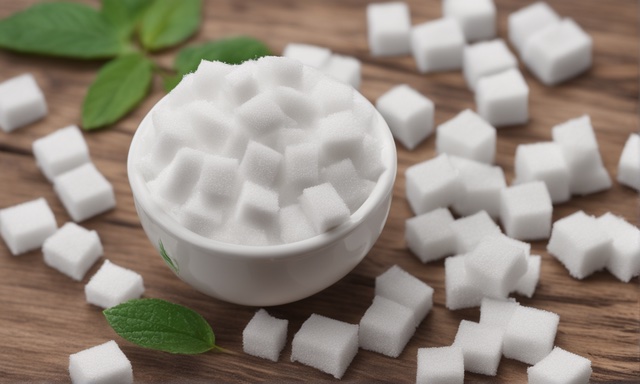Internet Asks: "Truvia vs Sugar"
In our quest for healthier living and dietary choices, understanding the differences between sugar and its alternatives becomes essential. Truvia, one such alternative, has been a topic of discussion. Let's dive deep into comparing Truvia with traditional sugar.
sponsored links

What Are They?
-
Truvia: It’s a branded sugar substitute, primarily composed of erythritol (a sugar alcohol), stevia leaf extract, and natural flavors. This combination offers sweetness without the caloric content associated with sugar.
-
Sugar: Traditionally derived from either sugarcane or sugar beet, sugar is a natural sweetener comprising sucrose, a combination of fructose and glucose. It's used ubiquitously in various food items for its sweet taste and energy-providing caloric content.
Caloric Content
- Truvia: Truvia is a zero-calorie sweetener, making it attractive to those watching their calorie intake.
- Sugar: Packed with calories, with a teaspoon containing around 16 calories, which can contribute to weight gain when consumed in excess.
Glycemic Index
- Truvia: With a glycemic index of zero, it minimally impacts blood glucose levels, making it a suitable option for diabetics.
- Sugar: Having a high glycemic index, sugar rapidly elevates blood glucose levels.
sponsored links
Dental Health
- Truvia: It doesn’t contribute to tooth decay or cavities as it doesn’t ferment when it comes into contact with mouth bacteria.
- Sugar: Promotes the growth of harmful bacteria in the mouth leading to dental issues like cavities and tooth decay.
Taste Profile
- Truvia: While sweet, it possesses a different taste profile from sugar, with some individuals noticing a mild aftertaste.
- Sugar: Offers a distinct sweetness that is universally recognized and accepted.
Health Consideration
- Truvia: Its components, erythritol and stevia, are generally recognized as safe (GRAS) by the FDA, though individual tolerance may vary.
- Sugar: While safe in moderation, excessive consumption of sugar is linked to numerous health issues, including obesity, diabetes, heart disease, and other serious conditions.
Environmental Impact
- Agricultural Practices: Sugarcane cultivation can be resource-intensive and has environmental impacts, including habitat destruction and water usage concerns. Truvia's main component, stevia, typically requires less land and water.
Price
- Cost: Generally, Truvia tends to be more expensive than regular sugar. However, since you might use less Truvia due to its higher sweetness intensity, the cost per usage may balance out over time.
Conclusion
Truvia and sugar offer different advantages and considerations, and the best choice often depends on individual needs and preferences. While Truvia presents a calorie-free, tooth-friendly option that's gentle on blood sugar, traditional sugar offers a natural, time-tested sweetness that many are accustomed to. It's always essential to consume sweeteners, whether natural or artificial, in moderation and in alignment with one's health goals.
Disclaimer: This article is intended for informational purposes only and is not a substitute for professional medical advice, diagnosis, or treatment. Always consult with your physician or other qualified health providers with any questions you may have regarding a medical condition or dietary change.
sponsored links
References
1. Truvia About Truvia® Sweetness. https://www.truvia.com/why-truvia#:~:text=Three%20Ingredients.&text=Truvia%20Calorie%2Dfree%20Stevia%20Sweetener,and%20extract%20its%20natural%20sweetness
2. UCSF Medical Center Nutrition & Food Services. Sweeteners. https://dtc.ucsf.edu/pdfs/Sweeteners_04.30.10.pdf
3. Diabetes UK. sugar, sweeteners and diabetes. https://www.diabetes.org.uk/guide-to-diabetes/enjoy-food/carbohydrates-and-diabetes/sugar-sweeteners-and-diabetes
4. Truvia Canada. Truvía® Health & Dietary Information. https://www.truvia.ca/health/diabetes
5. WebMD. What Is Erythritol?. https://www.webmd.com/diet/what-is-erythritol
6. Food Standards Australia & New Zealand. Steviol glycosides (960) (intense sweetener) (stevia) . https://www.foodstandards.gov.au/consumer/additives/Pages/Steviol-glycosides-(960)-(intense-sweetener)%20(stevia).aspx
7. Truvia UK. Truvía® Safety Research and Reports. https://www.truvia.co.uk/health/research/dental
8. Mazi TA, Stanhope KL. Erythritol: An In-Depth Discussion of Its Potential to Be a Beneficial Dietary Component. Nutrients. 2023 Jan 1;15(1):204. doi: 10.3390/nu15010204. PMID: 36615861; PMCID: PMC9824470.
9. Harvard T.H. Chan School of Public Health. Low-Calorie Sweeteners. https://www.hsph.harvard.edu/nutritionsource/healthy-drinks/artificial-sweeteners/
10. Harvard Health Publishing. The sweet danger of sugar. https://www.health.harvard.edu/heart-health/the-sweet-danger-of-sugar
People are also reading...
Is Truvia Safe for Diabetics?
Is Truvia the Same as Stevia?
Whole30 What to Expect?
Does Hot Chocolate Have Caffeine?
Are Carrots Acidic?
Are Mangoes Acidic?
Orange Juice pH?
Does Kahlua Have Caffeine?
Calories In a Grilled Cheese?
Is Watermelon Acidic?
6 oz Steak Calories?
Are Strawberries Acidic?
Ready to level-up?
Create meal plans 10x faster, follow up with your clients through our mobile app, and never struggle with meal planning or recipe management again.